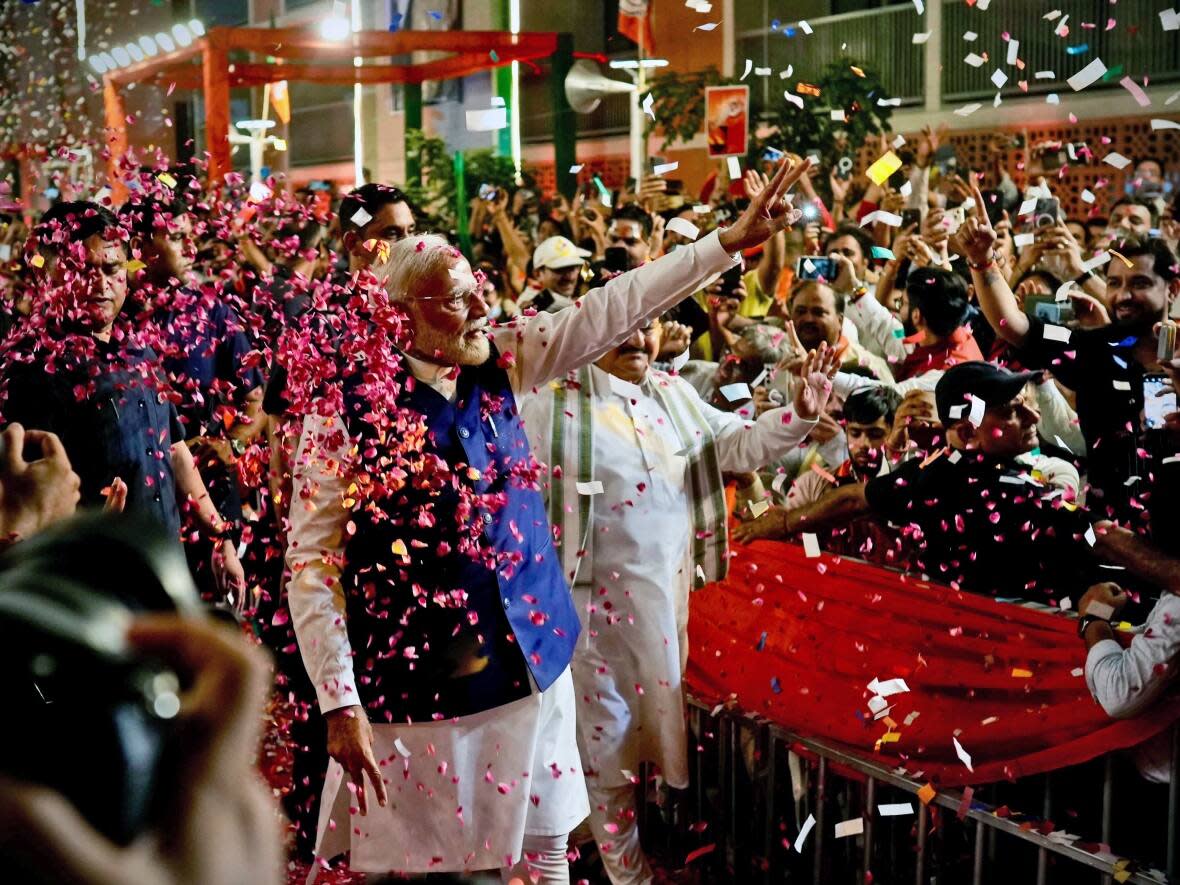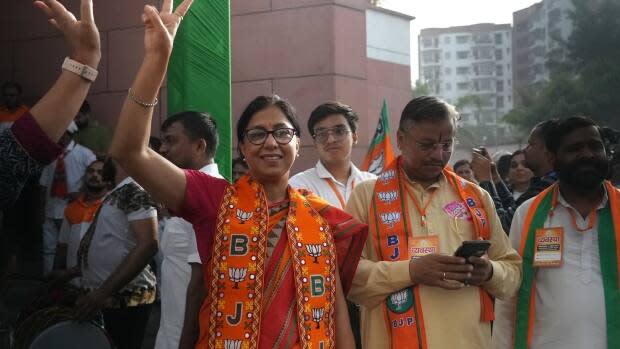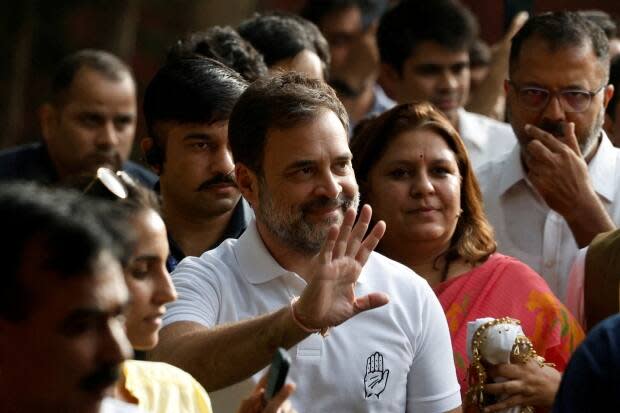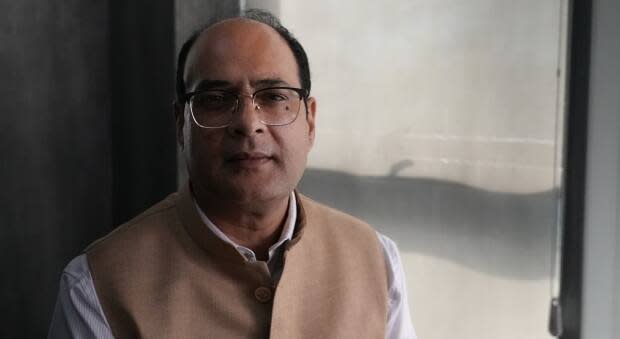India's Modi sees hopes of a larger majority dashed by surging opposition in election

The celebratory drum beats rang out steadily outside the headquarters of the Bharatiya Janata Party in India's capital, New Delhi, on Tuesday, but there was increasingly less enthusiasm from the crowd of several hundred people, as the shock of India's election results set in.
Indian Prime Minister Narendra Modi looked poised to secure a rare third term and declared victory on Tuesday evening, calling it "a historical feat in India's history" — even though his party appeared likely to lose a significant number of seats, falling shy of an outright majority.
The results mean the Bharatiya Janata Party (BJP) will need to rely on smaller alliance partners to form a government.
"Today's victory is the biggest in the world," Modi told his supporters, calling it "a victory for Indians."
A third-consecutive term for Modi, after 10 years in office, is a feat not accomplished by any politician since the country's first post-independence prime minister, Jawaharlal Nehru.
Outside the BJP's headquarters, supporters were digesting the results and trying to make the best of them.

"For continuously 10 years, it's very difficult to maintain the same level. [Modi] did his best," said Delhi resident Alka Joshi, 58.
"We are very elated, because ... in spite of 26 parties against us, we still won," Joshi said, referring to the opposition alliance that had banded together to mount a collective front against the dominant BJP.
Congress Party given 'a new lease on life'
A few kilometres away, where supporters of the main opposition party, the Indian National Congress (known as the Congress Party), had gathered, there was jubilation.
"What has the BJP given us?" asked Congress supporter Richa Sharma, 39. "There is only unrest in the country and hatred in the country.
"This was our last hope to save democracy, to save the constitution."

The leading face of the party, Rahul Gandhi, heir to a political dynasty that has seen three generations serve as India's prime minister, echoed that idea as he commented on the initial results.
"It was in my mind since the start ... when the BJP cancelled our bank account, put chief ministers in prison," Gandhi said. "It was in my mind that the people of India would stand together to fight for their constitution."
India's secular values are enshrined in its constitution, and critics of Modi's BJP have accused the party of whittling away at the country's dedication to pluralism during its decade in power. A two-thirds majority in Parliament would have allowed permanent changes to that constitution.
The Congress Party, which ruled India for many decades after independence, and Gandhi had largely been written off after the BJP won two commanding majorities in 2014 and 2019.
Tuesday's results, with the opposition party appearing to double its seats from 2019, "has given the Congress a new lease on life," said Chandrachur Singh, an associate professor of politics at the University of Delhi's Hindu College.
"It brings a lot of hope to them and brightens their prospects," Singh said, adding that the party is now in a position to influence and block policies it does not agree with.
WATCH | India's 642 million voters await election results:
Official vote tally differs from exit polls
The election, and a third mandate, may have cemented Modi's place as India's most powerful politician in decades, but the results are a clear setback for the prime minister and his BJP, after they had boasted in the lead-up to the election that they would win more seats than ever before.
The BJP had pledged it would secure 370 seats, with its NDA alliance bringing their combined tally up to 400 seats in India's Parliament — a big boost from the 303 the party won in the 2019 general election. Instead, the BJP looked set to lose more than 60 seats.

As the early results poured in, revealing a much narrower win for Modi than expected, markets plunged in the largest single-day drop since the COVID-19 pandemic hit in 2020.
By the end of trading on Tuesday, as the results crystallized, the markets were down six per cent, erasing much of the year's gains.
The official vote count, showing Modi's party falling far short of what it had hoped for, was also starkly different from the exit polls released on the weekend after the last day of polling wrapped up in India's marathon six-week election, where 642 million people voted in phases.
Those polls, breathlessly communicated by India's mainstream media outlets — which are largely seen as fawning and pro-Modi — predicted a decisive landslide victory for Modi's Hindu nationalist BJP, even though some analysts believed the tenor of the election campaign betrayed a nervous energy in the party's ranks.
Modi resorted to incendiary speeches targeting India's Muslim minority on the campaign trail, with increasingly shrill attacks against the community that makes up 14 per cent of the country's 1.4 billion people.
He called Muslims "infiltrators" who "have more children," and also warned Hindu voters against what the prime minister called an opposition-promoted "vote jihad," referring to Muslim votes.
'Unmitigated heat and undisguised hate'
That inflammatory rhetoric turned off some voters, even some of those casting a ballot for the BJP.
"I do feel sad about it," said Dr. Ravi Mahajan, a 64-year-old plastic surgeon from Amritsar, in India's northern Punjab state, as he voted during the last phase on Saturday. "It is something that should not happen."
Mahajan said he would like to have seen a campaign focused more on economic development and improving the welfare of Indians who are struggling, rather than on "sectarian issues which are dividing society."
But he put the blame for the shrill attacks on "both sides" — Modi's BJP, as well as the opposition alliance led by the Congress Party.
The Election Commission of India, led by a three-member panel nominated by the government, was accused of ignoring calls to police anti-Muslim rhetoric on the campaign trail and to prevent violations of election rules.
The commission mustered a feeble call for restraint, alluding to speeches by "star campaigners" and requesting politicians refrain from campaigning along caste or religious lines.

One former election commissioner of India, Ashok Lavasa, wrote in an op-ed in the English-language newspaper the Tribune that "this election will go down as one of unmitigated heat and undisguised hate, both unprecedented."
Dozens of polling staff died in the northern states of Uttar Pradesh and Bihar after an intense heat wave hit the area during the last days of the election.
Anti-Muslim rhetoric a shift in strategy
The emphasis on anti-Muslim rhetoric was a perceived shift in strategy for the ruling BJP, which most analysts had predicted would cruise to victory.
"We hadn't seen Prime Minister Modi, at least for the last year and a half, directly playing on the Hindu-Muslim religious axis during election campaigns," said Rahul Verma, a fellow with the Delhi-based Centre for Policy Research.
He saw it as a "knee-jerk reaction" to energize the BJP's voter base in a lacklustre election without a unifying issue, rather than a more deep-seated worry over the party's electoral prospects.
WATCH | India's 'mind-boggling' election explained:
"For one, the religious divide is part of the BJP's ideological platform. It's not new."
According to Verma, this election was different from previous ones because there wasn't a "charged or polarized political atmosphere," contrary to what Modi has experienced in previous contests.
"What changed in this election is there were instances when the BJP, rather than setting the narrative, had to respond to the opposition's narrative," he said.
Modi has never ruled without firm majority
For Chandrachur Singh of the University of Delhi's Hindu College, the message from India's voters is pretty clear.
"The BJP will have to rethink about going too hard on certain issues," such as religious divisions that don't resonate with younger voters, he said.
"This is also a time of introspection [for the ruling party]," Singh said, adding that while the BJP appears to still be in the driver's seat, Modi has never ruled without a decisive majority — either as prime minister or as chief minister of the Indian state of Gujarat.

That could mean that his style of governing will need to change if he has to work more closely with allies to get policies through Parliament.
The election was also marked by allegations of irregularities, with reports of BJP supporters trying to suppress turnout among Muslim voters — who do not traditionally vote for the Hindu nationalist party — and allegations of efforts to remove opposition candidates from the ballot. Several party workers were caught on video casting multiple votes.
At a pair of public viewing screens, set up in central Delhi's congested Connaught Place, many passersby stopped to watch the results trickle in.
"This opposition party has performed very well. They are competing with Modi," said retiree Virendar Gupta, 79.
Gupta might have voted for the BJP, but he said he was still pleased with the results, which he saw as tempering Modi's power.
"The opposition should be there to fight," he said. "Then the Parliament will run very [well]."


